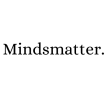An introduction to Mindsmatter — I Wish I Could Be Normal #1
Have you ever said to yourself: "I wish I could be normal"?

Have you ever said to yourself: "If only I could have peace of mind, mental and emotional well-being, and control this anxiety or depression better, then I could enjoy my life, go out more, enjoy time with my family and friends, achieve my dreams, spend time with the people I love and be happy"?
Or simply "I wish I could be normal"?

If you are reading this blog, it is because perhaps anxiety, depression, or one of the 200+ classified mental illness es have caused you suffering, and you are looking for ways to improve yourself, find ways to cope when the days are tough, looking for a safe space perhaps, or simply want to connect with others who are going through a similar experience.
Mental health issues are not something to downplay, they can completely alter the way we see and interact with the world, our loved ones and the things we enjoy. But you don't have to keep living in a constant state of pain and anguish alone, friendless.
That is why we created Mindsmatter.
As a way for people to come together and share their stories, learn ways people have coped and what resources they use, (we will also be creating resources that you can use soon) that could benefit you too. A place where you won't be judged or shamed or stigmatized for how you feel. Because we believe all minds matter and everyone should get the help and support they need, regardless of status, age, gender or geography.
What is Mental Health Really About Anyway?
When someone asks you if you are healthy, most people associate health with the physical state of the body. Today more than ever, mental health must be considered fundamental to health in general, because without it, people cannot fully be, complete.
The World Health Organization (WHO) defines mental health as a state of well-being in which people can cope with life's stresses, work productively, and contribute to their community in positive ways. For this reason, mental health and social well-being must be considered as fundamental areas of what it is to be human.
Part of the human essence is our ability to think, express our feelings, and interact with other people. When these abilities are missing or not working as well as they normally would, not only the individual but their environment is affected. That is why safe spaces to turn to are vital for the recovery of each individual and that's what we offer at Mindsmatter. To be part of the solution in helping those with mental health live their lives to the fullest.
Breaking The Stigma: Our Minds Get Sick Too

Have you ever heard someone with depression or anxiety being told: " just calm down" or " it's all in your head" the proverbial " be strong" or the I've had enough of you " get over it, there's absolutely nothing wrong with you! ".
These are some of themost dangerous and demoralizing things that can be said to someone who is struggling to maintain their mental health.
When someone with mental health problems hears this, the first thing they think is that they do not value what they feel, that people do not understand what they are going through or that they are minimizing their suffering.
This is something that we've known since the age of 4 or 5 years, everyone knows it, yet few take it into account. And the is that the brain is an organ, an organ like the heart, lungs, intestines or liver, and just like them it has its particular functions. It is an organ that needs a blood supply, oxygen, glucose and nutrients and like all organs. It is also made up of cells.
Everyone knows that, but when it comes to talking about mental symptoms, no one takes it into account.
When studies of the brain are performed in people with anxiety and depression, a clear difference is observed from the brains of people without these symptoms. This shows that mental illnesses have a representation in the brain, the circuits are affected, they work differently. Sure the symptoms are in the mind, but the mind is in the brain.

Mental health requires a holistic approach, along with the different therapies and medication, we mustn't forget the human element, we need to connect with people to hear their stories and tell ours. We need a place where we can belong and know that we have the support and the encouragement we need to be better. Without judgement. Without stigmatization. Without fear.
That's what we hope to achieve here at Mindsmatter: A safe space. A place where your experiences are valuable. A support group. A resource library. Because sometimes it's those little things, the ones that may not be so obvious, that make the biggest difference.
---
Originally published at https://www.mindsmatterinc.com on September 1, 2020.
Want Even More?
Grab the latest updates from Mindsmatter. Exclusive stories, mental health resources and more!
About the Creator
Mindsmatter.
Mindsmatter is written by Bola Kwame, Jack Graves and Emma Buryd.
De-stigmatizing mental illness one day at a time.
Our socials: https://linktr.ee/Mindsmatter






Comments
There are no comments for this story
Be the first to respond and start the conversation.